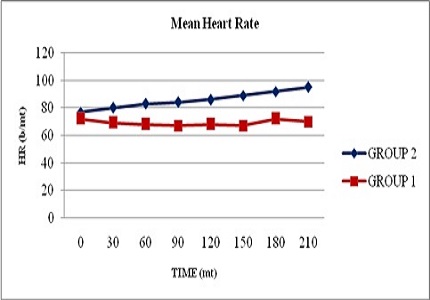The efficacy of intravenous clonidine premedication to reduce surgical area bleeding in posterior lumbar spine fusion surgery
Abstract
Background: A posterior lumbar spine fusion surgery always associated with significant amount of blood loss and requires blood transfusion. The purpose of this study is to evaluate the efficacy of intravenous clonidine premedication to achieve bloodless surgical field and decrease the need for blood transfusion by controlled hypotension.
Methods: Sixty patients scheduled for posterior lumbar fusion surgery were included in this randomized placebo controlled trail. Patients were classified into two groups: Group 1 received intravenous clonidine 3 µg/kg by infusion over 15 minutes before surgery and Group 2 received placebo as same. Hemodynamic variables, quality of surgical field by bleeding severity score, estimated amount of blood loss, duration of surgery and any blood transfusion were analyzed.
Results: Heart rate and mean arterial pressure found less in clonidine group than placebo but not significant. The estimated blood loss (390.8±99.99 mL vs 741.13±79.90 mL; P = 0.001*) and duration of surgery (160.67±16.91 vs 205.9±16.72 min, P=0.001*) were significantly less in clonidine group compared to placebo. The quality of surgical field was better in clonidine group than placebo at all times. No cases of severe bradycardia or clinically significant hypotension were observed in clonidine group.
Conclusion: Premedication with intravenous clonidine 3 µg/kg found clinically safe & effective drug in controlling blood loss and improves quality of surgical field in posterior lumbar fusion surgeries as a sole agent.
Downloads
References
2. Szpalski M, Gunzburg R, Sztern B. An overview of blood-sparing techniques used in spine surgery during the perioperative period. Eur Spine J. 2004 Oct;13 Suppl 1:S18-27. Epub 2004 Jun 15. [PubMed]
3. Dutton RP. Controlled hypotension for spinal surgery. Eur Spine J. 2004 Oct;13 Suppl 1:S66-71. Epub 2004 Jun 9. [PubMed]
4. Degoute CS. Controlled hypotension: a guide to drug choice. Drugs 2007;67(7):1053–76. [PubMed]
5. Singh S, Arora K. Effect of oral clonidine premedication on perioperative haemodynamic response and postoperative analgesic requirement for patients undergoing laproscopic cholecystectomy. Indian J Anaesth. 2011 Jan;55(1):26-30. doi: 10.4103/0019-5049.76583.
6. Dolman RM, Bentley KC, Head TW, English M. The effect of hypotensive anesthesia on blood loss and operative time during Le Fort I osteotomies. J Oral Maxillofac Surg. 2000 Aug;58(8):834-9; discussion 840. [PubMed]
7. Amr YM, Amin SM. Effects of preoperative oral beta blocker versus intraoperative nitroprusside or esmolol on quality of surgical field during tympanoplasty. J Clin Anesth. 2011 Nov;23(7):544-8. doi: 10.1016/j.jclinane.2011.02.007. [PubMed]
8. Butler JS, Burke JP, Dolan RT, Fitzpatrick P, O'Byrne JM, McCormack D, Synnott K, Poynton AR. Risk analysis of blood transfusion requirements in emergency and elective spinal surgery. Eur Spine J. 2011 May;20(5):753-8. doi: 10.1007/s00586-010-1500-0. Epub 2010 Jun 27.
9. Fosco M, Di Fiore M. Factors predicting blood transfusion in different surgical procedures for degenerative spine disease. Eur Rev Med Pharmacol Sci. 2012 Nov;16(13):1853-8.
10. Zheng F, Cammisa FP Jr, Sandhu HS, Girardi FP, Khan SN. Factors predicting hospital stay, operative time, blood loss, and transfusion in patients undergoing revision posterior lumbar spine decompression, fusion, and segmental instrumentation. Spine (Phila Pa 1976) 2002;27:818-24.
11. Carlos Marcucci, Caveh Madjdpour and Donat R Spahn. Allogeneic blood transfusions: benefit, risks and clinical indications in countries with a low or high human development index. Br Med Bul 2004;70:15-28. [PubMed]
12. Paul JE, Ling E, Laonde C, Thabane L.Delibrate hypotension in orthopedic surgery reduces blood loss and transfusion requirements: a meta-analysis of randomized controlled trials. Can J Anaesth. 2007 Oct;54(10):799-810. [PubMed]
13. Malcolm-Smith NA, McMaster MJ. Effect of clonidine premedication on blood loss in spine surgery. Anesth Pain Med. 2012 Spring;1(4):252-6. doi: 10.5812/aapm.2197. Epub 2012 Apr 1. [PubMed]
14. Taghipour Anvari Z, Afshar-Fereydouniyan N, Imani F, Sakhaei M, Alijani B, Mohseni M. Effect of clonidine premedication on blood loss in spine surgery. Anesth Pain Med. 2012 Spring;1(4):252-6. doi: 10.5812/aapm.2197. Epub 2012 Apr 1. [PubMed]
15. Ebneshahidi A, Mohseni M. Premedication with oral clonidine decreases intraoperative bleeding and provides hemodynamic stability in cesarean surgery section. Anesth Pain. 2011;1(1):30-3.
16. Jabalameli M, Hashemi S, Soltani H, Hashemi S. Oral clonidine premedication decreases intraoperative bleeding in patients undergoing endoscopic sinus surgery. J Res Med Scie. 2005;10(1):25-30.
17. Kulka PJ, Tryba M, Zenz M. Dose-response effects of intravenous clonidine on stress response during induction of anesthesia in coronary artery bypass graft patients. Anesth Analg. 1995 Feb;80(2):263-8.
18. Lee J, Lovell AT, Parry MG, Glaisyer HR, Bromley LM. I.v. clonidine: does it work as a hypotensive agent with inhalation anaesthesia? Br J Anaesth. 1999 Apr;82(4):639-40. [PubMed]
19. Sahajananda H and Rao S. Effects of intravenous clonidine on haemodynamics and on plasma cortisol level during laparoscopic cholecystectomies. Indian J Anaesth. 2015 Jan;59(1):53-6. doi: 10.4103/0019-5049.149458. [PubMed]
20. Altan A, Turgut N, Yildiz F, Türkmen A, Ustün H. Effects of magnesium sulphate and clonidine on propofol consumption, haemodynamics and postoperative recovery. Br J Anaesth. 2005 Apr;94(4):438-41. Epub 2005 Jan 14.
21. Samantaray A, Rao MH, Chandra A. The effect on post-operative pain of intravenous clonidine given before induction of anaesthesia. Indian J Anaesth. 2012 Jul;56(4):359-64. doi: 10.4103/0019-5049.100817. [PubMed]
22. Ray M, Bhattacharjee DP, Hajra B, Pal R, Chatterjee N. Effect of clonidine and magnesium sulphate on anaesthetic consumption, haemodynamics and postoperative recovery: A comparative study. Indian J Anaesth. 2010 Mar;54(2):137-41. doi: 10.4103/0019-5049.63659.



 OAI - Open Archives Initiative
OAI - Open Archives Initiative


